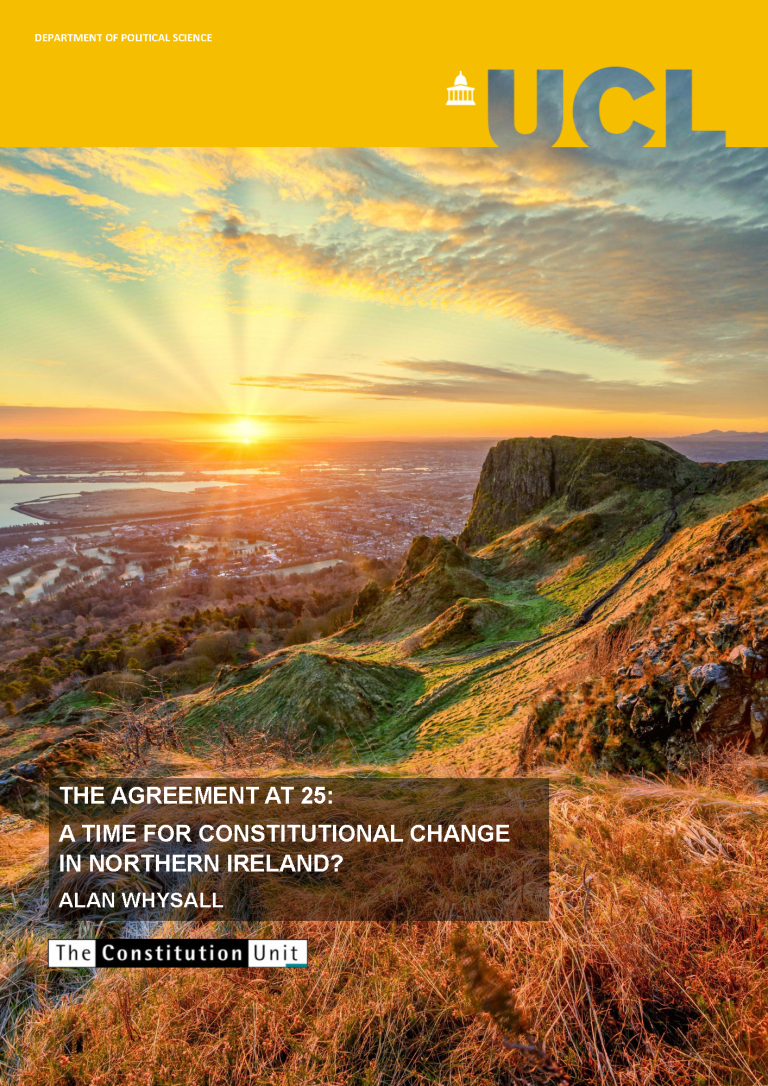NEW REPORT: The Agreement at 25: a time for constitutional change in Northern Ireland?
6 April 2023
On the 25th anniversary of the Belfast/Good Friday Agreement, Alan Whysall’s new report sets out the prospects for Northern Ireland’s constitutional future. He concludes that early constitutional change is unlikely. But he argues action is urgently needed to revive the Agreement.

In this new report, released to coincide with the 25th anniversary of the signing of the Belfast/Good Friday Agreement in April 1998, Constitution Unit Honorary Senior Research Associate Alan Whysall explores the prospects for and debates around ‘unity’ (a united Ireland) and the ‘Union’ (staying within the United Kingdom) in Northern Ireland.
While polling and election results suggest that support for Irish unity has increased in Northern Ireland, a majority for unity in the near future seems unlikely. In the South, polling returns substantial majorities for unity, but also suggests that attitudes could change significantly as the consequences of unification became clearer.
What are the prospects for the Union? Given the shrinking support for unionist political parties, the swing constituency in a vote on unity would be supporters of the Alliance Party and ‘soft’ nationalists. But little is heard from political unionism about how it would address these voters. And unionism commands little understanding or support in Great Britain or further afield. There are ways in which the pro-Union cause could make a broader appeal – but it involves willingness to contemplate change, and finding the arguments and the people to address new audiences.
Increasing numbers appear to think, on the basis of polling and election results, that unity is an early prospect. But the debate remains at a high level of generality. Difficult questions regarding the route to unity, and what a united Irish state would look like, have so far been neglected. When they are addressed, and the practicability of a united Ireland achieved on the basis of a bare majority comes more closely into view, the outlook on the desirability of early constitutional change may shift.
There are fewer discussions at present about gradualist approaches that would put the early priority on promoting reconciliation within the island, before seeking constitutional change. Here, as with unionism, we need a more comprehensive, questioning debate, from which proposals may emerge that command a wider measure of support.
Ultimately, the report concludes that early constitutional change is unlikely to come about, or to resolve many of Northern Ireland’s immediate problems if it did. Meanwhile, the Belfast/Good Friday Agreement – the only plausible framework for stable government in Northern Ireland for the foreseeable future – is in some danger of withering away.
Early action is needed to bring back the Agreement institutions, along with the hope and momentum that it generated. Resurrecting the institutions may require temporary steps to overcome vetoes. But there is much more to do beyond that, to restore the underpinnings of the Agreement, and promote the stability and reconciliation it promised. And London, in close partnership with Dublin, has to play a full and sustained role in bringing that about.
 Close
Close

